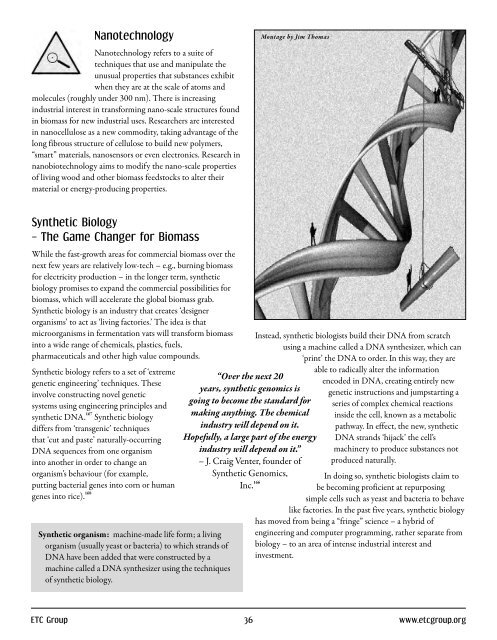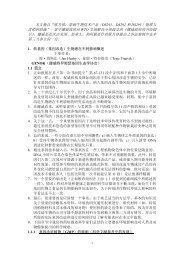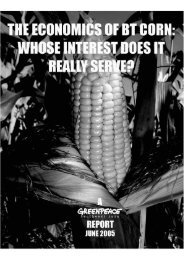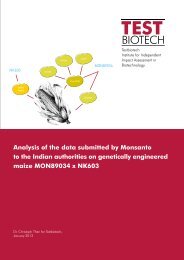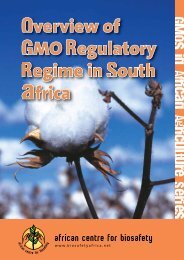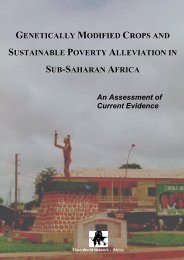English - pdf - 2145 Kb - Biosafety Information Centre
English - pdf - 2145 Kb - Biosafety Information Centre
English - pdf - 2145 Kb - Biosafety Information Centre
- No tags were found...
You also want an ePaper? Increase the reach of your titles
YUMPU automatically turns print PDFs into web optimized ePapers that Google loves.
NanotechnologyNanotechnology refers to a suite oftechniques that use and manipulate theunusual properties that substances exhibitwhen they are at the scale of atoms andmolecules (roughly under 300 nm). There is increasingindustrial interest in transforming nano-scale structures foundin biomass for new industrial uses. Researchers are interestedin nanocellulose as a new commodity, taking advantage of thelong fibrous structure of cellulose to build new polymers,“smart” materials, nanosensors or even electronics. Research innanobiotechnology aims to modify the nano-scale propertiesof living wood and other biomass feedstocks to alter theirmaterial or energy-producing properties.Synthetic Biology– The Game Changer for BiomassWhile the fast-growth areas for commercial biomass over thenext few years are relatively low-tech – e.g., burning biomassfor electricity production – in the longer term, syntheticbiology promises to expand the commercial possibilities forbiomass, which will accelerate the global biomass grab.Synthetic biology is an industry that creates ‘designerorganisms’ to act as ‘living factories.’ The idea is thatmicroorganisms in fermentation vats will transform biomassinto a wide range of chemicals, plastics, fuels,pharmaceuticals and other high value compounds.Synthetic biology refers to a set of ‘extremegenetic engineering’ techniques. Theseinvolve constructing novel geneticsystems using engineering principles andsynthetic DNA. 167 Synthetic biologydiffers from ‘transgenic’ techniquesthat ‘cut and paste’ naturally-occurringDNA sequences from one organisminto another in order to change anorganism’s behaviour (for example,putting bacterial genes into corn or humangenes into rice). 168Synthetic organism: machine-made life form; a livingorganism (usually yeast or bacteria) to which strands ofDNA have been added that were constructed by amachine called a DNA synthesizer using the techniquesof synthetic biology.“Over the next 20years, synthetic genomics isgoing to become the standard formaking anything. The chemicalindustry will depend on it.Hopefully, a large part of the energyindustry will depend on it.”– J. Craig Venter, founder ofSynthetic Genomics,Instead, synthetic biologists build their DNA from scratchusing a machine called a DNA synthesizer, which can‘print’ the DNA to order. In this way, they areable to radically alter the informationencoded in DNA, creating entirely newgenetic instructions and jumpstarting aseries of complex chemical reactionsinside the cell, known as a metabolicpathway. In effect, the new, syntheticDNA strands ‘hijack’ the cell’smachinery to produce substances notproduced naturally.In doing so, synthetic biologists claim tobe becoming proficient at repurposingsimple cells such as yeast and bacteria to behavelike factories. In the past five years, synthetic biologyhas moved from being a “fringe” science – a hybrid ofengineering and computer programming, rather separate frombiology – to an area of intense industrial interest andinvestment.Inc. 166 Montage by Jim ThomasETC Group 36 www.etcgroup.org


